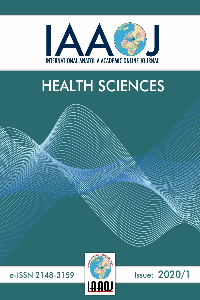
International Anatolia Academic Online Journal Health Sciences
Yazarlar: Dilan DENİZ AKAN, Aleyna ADIYAMAN, Gülnihal IŞIK, Bejna KILIÇ, Sezgi ÇINAR PAKYÜZ
Konular:Sağlık Bilimleri ve Hizmetleri
Anahtar Kelimeler:Microbiota,Knowledge level,Probiotic,Health workers
Özet: The number of studies on microbiota in the scientific world has been increasing in recent years. It is important for healthcare workers to know the concept of microbiota and follow the developments in the world of science. This research was planned to determine the knowledge level of healthcare professionals working in the university hospital about microbiota. This research is descriptive-cross-sectional. The data is at a university hospital in the west of Turkey were collected between January-February 2020. The sample of the study consisted of 117 healthcare workers at the hospital where the study was conducted, who agreed to participate in the study and completed the questionnaire form completely. The data were collected by the researchers using face to face interview technique. Number - percentage distributions and chi-square test were used to evaluate the data. The average age of the health workers participating in the study was 32.09 ± 6.15, 38 (32.5%) of the participants were doctors, 70 (59.8%) nurses and 9 (7.7%) were other health workers. 55.6% of the participants stated that they had not heard of the concept of microbiota before, and 49.6% of them stated that they wanted to get information about microbiota. When questioned the knowledge levels of the participants about microbiota, they stated that 8.5% were good, 29.1% were moderate and 62.4% were low. When asked about his opinions about the microbiota, 57.3% stated that he was "looking with suspicion". The rate of hearing the concept of microbiota among physicians was higher. Most of the probiotic foods (66%) were known kefir. As a result, over half of health workers stated that they have never heard of the concept of microbiota before. Therefore, there is a need for initiatives to increase the knowledge level of healthcare workers about microbiota. It may be beneficial to include microbiota and probiotic subjects in in-service training and undergraduate health sciences education curriculum.